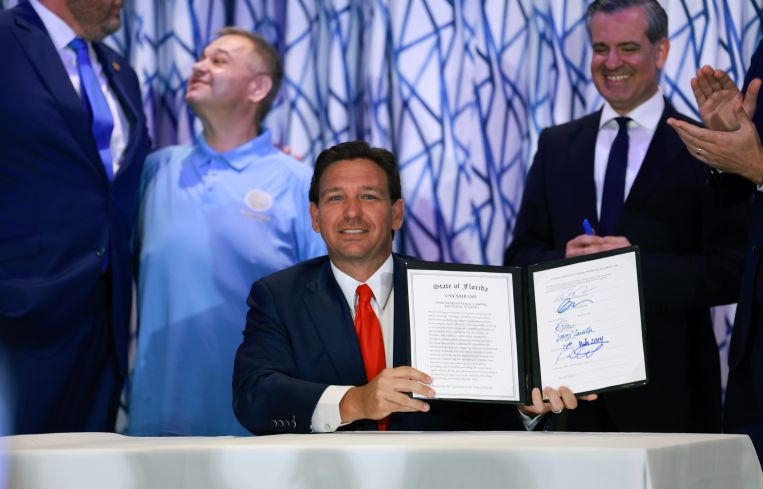DeSantis Signs Bill Banning Homeless People From Sleeping in Public Places
Law requires local governments to set up homeless camps if shelters are full
By Julia Echikson March 21, 2024 10:01 am
reprints
Florida Gov. Ron DeSantis on Wednesday signed into law legislation banning homeless people from setting up camps and sleeping in parks, on sidewalks and in other public spaces.
The legislation, known as HB 1365, is intended to push unhoused people to seek shelter and prevent Florida, where housing costs have skyrocketed since the pandemic, from becoming afflicted with homelessness like New York and California, proponents say.
“Florida will not allow homeless encampments to intrude on its citizens or undermine their quality of life like we see in states like New York and California,” Gov. DeSantis said.
But critics fear the new law, which goes into effect in October, essentially criminalizes homelessness. They predict the law could lead to an uptick in arrests without providing solutions that address the root causes of homelessness, which are often attributed to drug addiction and a lack of affordable housing.
When the COVID pandemic hit, thousands of Northerners decamped to the Sunshine State and pushed up housing costs. Last year, Florida’s homeless population grew by nearly 20 percent, according to state figures.
Under new law, municipalities and counties would be forced to create homeless camps if shelters approved by Florida Department of Children and Families fill up. Local governments would be required to provide restrooms and running water as well as access to substance abuse and mental health treatment
To ensure enforcement, the new law allows businesses and private citizens to sue municipalities and counties. In response, they would be forced to “cure the alleged violation” in five days, starting in 2025. The state has allocated up to $10 million to help counties comply.
Critics say the law’s treatment provisions mask its true intent.
“You don’t really mean it that you’re trying to help homeless people, let’s be honest,” Sen. Jason Pizzo, a Democrat representing parts of Broward and Miami-Dade counties, said on the state Senate floor earlier this month.
Homeless camps have proved to be controversial in Miami. In 2022, the Miami City Commission proposed a plan to create up to 100 tiny homes to house homeless people on Virginia Key. But the commission abandoned the plan after fierce backlash from activists, residents and the Miami-Dade County government.
Across the Intracoastal Waterway, Miami Beach has been responsive to the legislation. Mayor Steven Meiner co-hosted a press conference alongside Gov. DeSantis Wednesday before the Republican lawmaker signed the bill.
In October, the Miami Beach Commission approved an ordinance making it easier for police officers to arrest homeless people who sleep in public spaces and refuse shelter.
To address the shortfall of housing, Florida lawmakers passed a sweeping law last year, known as the Live Local Act, to boost the construction of workforce housing. Critics have argued that the law gives too many incentives to developers and doesn’t require enough workforce apartments in return.
Julia Echikson can be reached at jechikson@commercialobserver.com.



